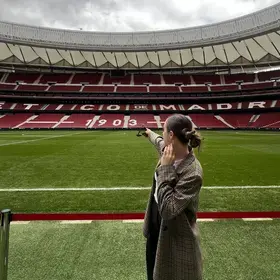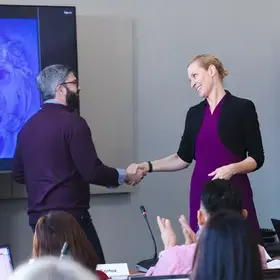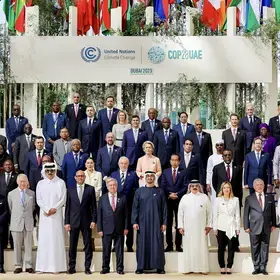Allison Reser, '22SPS, Sustainability Management, Project Manager at TerraCycle, wrote the below op-ed in Claudia Dreifus' "Writing About Global Science for the International Media" course.
On a recent vacation away from grad school life in New York City, my partner and I kayaked out to The Landing, a dock-side restaurant on Lake Charlevoix, Michigan.
Famished from paddling, we ordered the nachos.
When our order arrived, the giant heap of chips, cheese, pulled pork, and salsa appeared to be far too much for two people to eat. But with no space in our boats for leftovers, we chose to eat the whole thing.
This was an opportunity to practice what I preach as a sustainability professional – which is to never waste food!
Sitting there with my full stomach, I noticed the server deliver the same hefty meal to the couple sitting beside us at the bar. Yet when they threw their napkins on top and pushed it back to be cleared, the pair had eaten barely half of it.
How could they throw perfectly good food away? Didn’t they know all the precious natural resources that went into making it??
My initial reaction was to judge this couple for wasting food. But then I remembered my training; In 2015, I was part of the first graduating class to earn a sustainability bachelor's degree from Colorado State University and am now in the Sustainability Management masters program at Columbia University. This expertise helps me see a complex series of tradeoffs where other people may see only a simple everyday decision.
Tradeoffs exist anytime one decision affects something else. In the sustainability field, we’re trying to solve big picture problems like the climate crisis. But there’s no one right way to do this because the world is full of tradeoffs—including at the dinner table.
In fact, whatever I’m doing, be it something large or small, I think about how a decision might emit greenhouse gases like carbon dioxide that contribute to climate change. Or how the decision will impact wildlife habitat or human health down the line. Or what resources the decision will require.
For example, installing solar panels in an open field will produce clean electricity, but the ground below will be blocked from sunlight. How will this affect plant life? Another example is each time you use a reusable grocery bag, you’ve saved a disposable bag. But the reusable bags require more resources to make, so if you lose it or throw it away, did you use it enough times to be worth those extra resources?
The world is complicated and connected. Every seemingly straightforward solution should be evaluated based on how it affects the whole system when you zoom all the way out. That’s why a casual afternoon out to lunch became an impossible battle against the decision of what’s the right or wrong way to handle leftovers. Here are the questions I started asking myself when faced with the nacho dilemma at The Landing:
How many greenhouse gases will my body release when I digest the nachos? (To be gross about it—what is the ‘fart factor’ in all I eat?) How much will be left after digestion? What wastewater treatment plant will that remnant go to? How energy efficient is this plant? What toxins will it release as my waste is processed? For the couple who didn’t finish the nachos, what happens to it after the plate is removed from the table? Does it go to a landfill? How far away is that landfill? How fuel-efficient will the truck be that carries it there? How much methane will be released from its decomposition? Will the landfill leech harmful chemicals into the water and soil?
So, even the simple question of how to handle too much food requires the consideration of many tradeoffs. It’s hard to know for sure if the “over-eating approach” or the “sending back approach” is better for the planet. My worldview of seeking out tradeoffs sometimes makes me wonder if I made the right decision. But instead of feeling paralyzed by not having all the answers, I feel empowered by knowing to ask the questions.
If a plate of nachos has this hidden layer of complexity, can you imagine how complicated the climate crisis and other big issues are? To face complex problems, we must approach them with an equally complex way of thinking.
The views expressed are those of the author and do not necessarily represent the views of any other person or entity.


